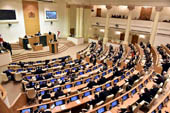
NGO speaks of unreasonable restrictions on entering Georgian parliament
By Tea Mariamidze
Monday, September 16
Transparency International (TI) Georgia non-governmental organization says that although only the security check is enough to get into the Parliament building, citizens are often unreasonably restricted to enter it.
The NGO reports that the citizens of Georgia, including members of the Parliament of Georgia, journalists, and non-parliamentary opposition representatives, have repeatedly been denied access to the Georgian Parliament after the large-scale protest rallies launched on June 20.
TI Georgia says they many times recommended the legislative body to simplify the rules for access to the Parliament building, adding the initiative was partially incorporated and Parliament only made the existing rules available on the website.
“Access to the rules makes no sense if citizens are denied access to the Georgian Parliament without any justification, without any legal basis,” the statement reads.
The organization says the access to the parliament building was restricted not only during July 20 protests but even afterward adding on September 3, 2019, at the opening of the autumn session, when the opposition lawmakers had trouble accessing the building. On the same day, the law enforcers did not allow the participants of the rally “It Is Shame” even to stand at the closed gate of Parliament.
The NGO stressed that entry and movement inside the parliament were restricted in parallel with the June protests and the deputy aide of an MP and the journalists were not allowed in the building of the legislative body.
TI says that the rules of entry into the building of the Parliament of Georgia are regulated by the order of the Chairman of the Parliament of Georgia who can tighten entry rules only because of the safety reasons. According to the law, a Member of Parliament cannot be restricted from entering the Parliament building and may not impose an upper limit on MPs’ entry to the building.
“Improving Parliament's openness and transparency is considered one of the legislative key achievements,” the NGO says, adding that in 2015, the Parliament of Georgia signed the Declaration of Parliamentary Openness and joined the Open Government Partnership Initiative, undertaking several commitments related to transparency and citizen engagement.
“Unfortunately, recent evidence suggests that the ban on entry into the Parliament building is not related to security measures and its main purpose is to restrict access to critical members of the committees,” the statement reads.
TI believes it is important for the Parliament of Georgia to maintain the achievements of openness and transparency that are of a high standard and have gained international recognition.


